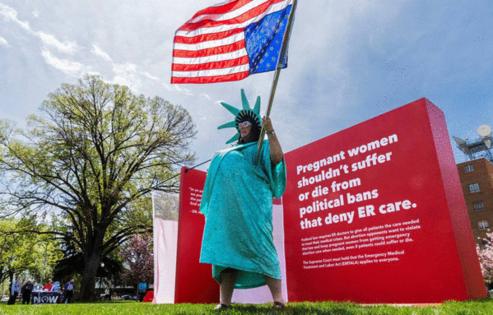Stroke, hemorrhage, sepsis: Idaho doctors detail ways abortion ban risks patients' health
Published in Political News
BOISE, Idaho — Dr. Becky Uranga has always loved working in emergency obstetrics. As an OB-GYN, she and her colleagues at OGA Women’s Health rotate emergency shifts, when Uranga spends 24 hours covering labor and delivery and caring for Treasure Valley patients with urgent medical needs.
For the last several months, those shifts have come with a new challenge. In January, a U.S. Supreme Court order allowed one of the strictest aspects of the state’s abortion law to take effect. Since Jan. 5, Idaho doctors have not been able to perform abortions to protect their patients’ health in a medical emergency.
Uranga told the Idaho Statesman that in some of those emergency situations her practice deals with, an abortion is the standard procedure to stabilize the patient and prevent infection, kidney failure, hemorrhaging or loss of fertility.
She recently saw a patient with previable preterm rupture of membranes — the patient’s water broke before her fetus was able to survive outside of the womb. Uranga said it’s a “classic case” for which abortion is the recommended treatment. Without it, the pregnant patient risks serious infection, detachment of the placenta from the uterine wall and other complications.
But Idaho law meant Uranga couldn’t offer her patient the treatment she needed.
“I remember going to see the patient in the ER, and then coming back to labor and delivery and ugly crying because there was nothing I could do,” Uranga said in an interview.
The patient ended up seeking an abortion in Oregon. She delivered her baby while en route to Portland.
Idaho physicians like Uranga told the Idaho Statesman how January’s Supreme Court order is impacting them and their patients, sharing heartrending details of medical emergencies, compounded by the fear that they could be criminally prosecuted for performing an abortion that doesn’t meet narrow exceptions. Emergency out-of-state transports of pregnant patients are on the rise, and several doctors told the Statesman they feel their hands are tied and their patients are receiving worse care.
“For decades we’ve been making health care better little by little, and it feels like it all got wiped away,” Uranga said.
The Supreme Court on Wednesday will hear oral arguments from Idaho and the U.S. Department of Justice to determine whether federal emergency medicine requirements take precedent over Idaho’s abortion law. Doctors said they fear what will happen if the court rules in Idaho’s favor.
...continued
©2024 Idaho Statesman. Visit at idahostatesman.com. Distributed by Tribune Content Agency, LLC.







Comments